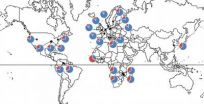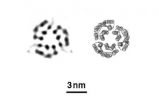(Press-News.org) New research from Karolinska Institutet in Sweden shows that the final stage of the normal inflammatory process may be disrupted in patients with Alzheimer's disease. A study published in the journal Alzheimer's & Dementia shows that levels in the brain and cerebrospinal fluid of the molecules necessary for tissue recovery through the clearance of harmful inflammatory substances are lower than normal in patients with Alzheimer's disease. The study also showed association between the lower levels of these molecules with impaired memory function.
Alzheimer's disease is the most common form of dementia, eventually leading to neuronal death associated with an increasing degree of memory impairment. As with other neurodegenerative diseases, Alzheimer's is characterised by an inflammatory process in the brain. Prolonged inflammation with the release of inflammatory and toxic substances can cause further damage and neuronal death.
The inflammatory process normally ends in what is known as resolution. This is an active process regulated by certain molecules, so called specialized pro-resolving mediators, where the tissue is cleared from microorganisms, debris from dead cells via an uptake mechanism (phagocytosis), and where the release of growth factors stimulates tissue repair.
Together with colleagues in the United States, researchers at Karolinska Institutet have now shown that the levels of resolution-regulating molecules in the brain and in the cerebrospinal fluid are lower in Alzheimer's disease than normal. The researchers have also shown that the lower levels of these molecules correlate with a lower degree of cognitive function, that is, memory capacity. The results are based on analyses of cerebrospinal fluid from 15 patients with Alzheimer's disease, 20 patients with mild cognitive impairment and 21 control subjects. The researchers also analysed brain tissue from 10 Alzheimer's patients and 10 control subjects.
"Our hypothesis is that stimulation of resolution of inflammation in Alzheimer's disease may result in reduced neuronal death in the brain, and in turn have a beneficial effect in disease progression and cognition. This is an entirely new approach and provides the opportunity to develop new treatment principles for Alzheimer's disease," says Professor Marianne Schultzberg, who led the study at the Department of Neurobiology, Care Sciences and Society.
In ongoing studies, the researchers are now investigating how the pro-resolving molecules affect neuronal death in cell cultures, and whether treatment in animal experiments with these substances can prevent neurodegeneration and improve memory functions. The pro-resolving molecules identified so far are derivatives of omega-3 fatty acids, which constitute a popular food supple-ment that has been ascribed several health benefits, and have received attention for beneficial effects also on factors related to Alzheimer's disease, in line with the new results described above. In previous studies, the researchers behind these new findings have shown that omega-3 also stimulates cells to take up amyloid-beta, a protein that kills neurons and occurs in the brain in the form of plaques in Alzheimer's disease.
INFORMATION:
The research was funded with support, among others, from the Swedish Research Council, Swedish Brain Power, Stockholm Community Council, the Chinese Scholarship Council, the Knut and Alice Wallenberg Foundation, Stiftelsen för Gamla Tjänarinnor, Alzheimerfonden, the Gun and Bertil Stohne Foundation, the Petrus and Augusta Hedlund Foundation.
Publication: 'Resolution of inflammation is altered in Alzheimer's disease', Wang X, Zhu M, Hjorth E, Cortés Toro V, Eyjolfsdottir H, Graff C, Nennesmo I, Palmblad J, Eriksdotter M, Sambamurti K, Fitzgerald JM, Serhan CN, Granholm A-C & Schultzberg M, Alzheimer's & Dementia, online 14 February 2014.
Karolinska Institutet - a medical university: http://ki.se/english
Impaired recovery from inflammation linked to Alzheimer's
2014-02-14
ELSE PRESS RELEASES FROM THIS DATE:
Social norms strongly influence vaccination decisions and the spread of disease
2014-02-14
Our response to societal pressures about vaccination has a direct effect on the spread of pediatric infectious diseases in areas where inoculation is not mandatory, says new research published this week in Proceedings of the Royal Society B.
By incorporating social norms into predictive mathematical modelling, a research team from the University of Guelph and the University of Waterloo found that they can foresee the observed patterns of population behaviour and disease spread during vaccine scares—times when anti-vaccine sentiment is strong.
"If vaccination is not ...
New insight into protein misfolding in neurodegenerative disorders
2014-02-14
Research by the University of Southampton has provided new insight into the consequence of accumulated 'misfolded proteins' in neurodegenerative disorders, such as Prion and Alzheimer's disease.
Prion and Alzheimer's disease are protein misfolding brain diseases, where genetic mutations, or more commonly, interactions between an individual's genetics and environmental influences cause functional proteins in neurons to become misfolded or misrouted. In these diseases, there is a progressive death of nerve cells in specific brain regions, which is associated with the increasing ...
Geographical passwords worth their salt
2014-02-14
It's much easier to remember a place you have visited than a long, complicated password, which is why computer scientist Ziyad Al-Salloum of ZSS-Research in Ras Al Khaimah, UAE, is developing a system he calls geographical passwords.
Writing in a freely available "open access" research paper in the International Journal of Security and Networks, Al-Salloum emphasizes how increasingly complicated our online lives are becoming with more and more accounts requiring more and more passwords. Moreover, he adds that even strong, but conventional passwords are a security risk ...
Antimicrobial preservation strategies to prevent food contamination
2014-02-14
New Rochelle, NY, February 13, 2014—Food spoiling and poisoning caused by microbial contamination can cause major health, social, and economic problems. The broad scope of antimicrobial approaches to kill or prevent the growth of microorganisms in foods and beverages, including a variety of natural and artificial preservative strategies, are described in a comprehensive Review article in Industrial Biotechnology, a peer-reviewed journal from Mary Ann Liebert, Inc., publishers. The article is available on the Industrial Biotechnology website.
In the Review "Ingredient ...
New depression treatments reported
2014-02-14
MAYWOOD, IL – New insights into the physiological causes of depression are leading to treatments beyond common antidepressants such as Prozac and Zoloft, researchers are reporting in the in the journal Current Psychiatry.
Depression treatments on the horizon include new medications, electrical and magnetic stimulation of the brain and long-term cognitive behavioral therapy for stress management.
Authors are Murali Rao, MD, and Julie M. Alderson, DO. Rao is professor and chair of the Department of Psychiatry and Behavioral Neurosciences at Loyola University Chicago ...
Geographic variation of human gut microbes tied to obesity
2014-02-14
People living in cold, northern latitudes have bacteria in their guts that may predispose them to obesity, according to a new study by researchers at the University of California, Berkeley, and the University of Arizona, Tucson.
The researchers' analysis of the gut microbes of more than a thousand people from around the world showed that those living in northern latitudes had more gut bacteria that have been linked to obesity than did people living farther south.
The meta-analysis of six earlier studies by UC Berkeley graduate student Taichi Suzuki and evolutionary ...
What do women want? It depends on the time of the month
2014-02-14
If she loves you and then she loves you not, don't blame the petals of that daisy. Blame evolution.
UCLA researchers analyzed dozens of published and unpublished studies on how women's preferences for mates change throughout the menstrual cycle. Their findings suggest that ovulating women have evolved to prefer mates who display sexy traits – such as a masculine body type and facial features, dominant behavior and certain scents – but not traits typically desired in long-term mates.
So, desires for those masculine characteristics, which are thought to have been ...
Another reason to not mix work and family: Money makes parenting less meaningful
2014-02-14
Austin – February 14, 2014 - Money and parenting don't mix. That's according to new research that suggests that merely thinking about money diminishes the meaning people derive from parenting. The study is one among a growing number that identifies when, why, and how parenthood is associated with happiness or misery.
"The relationship between parenthood and well-being is not one and the same for all parents," says Kostadin Kushlev of the University of British Columbia. While this may seems like an obvious claim, social scientists until now have yet to identify the psychological ...
In-hospital formula use deters breastfeeding
2014-02-14
(SACRAMENTO, Calif.) — When mothers feed their newborns formula in the hospital, they are less likely to fully breastfeed their babies in the second month of life and more likely to quit breastfeeding early, even if they had hoped to breastfeed longer, UC Davis researchers have found.
"We are a step closer to showing that giving formula in the hospital can cause problems by reducing how much women breastfeed later," says Caroline Chantry, lead author and professor of clinical pediatrics at UC Davis Medical Center. "Despite being highly motivated to breastfeed their babies, ...
Superbright and fast X-rays image single layer of proteins
2014-02-14
RICHLAND, Wash. -- In biology, a protein's shape is key to understanding how it causes disease or toxicity. Researchers who use X-rays to takes snapshots of proteins need a billion copies of the same protein stacked and packed into a neat crystal. Now, scientists using exceptionally bright and fast X-rays can take a picture that rivals conventional methods with a sheet of proteins just one protein molecule thick.
Using a type of laser known as XFEL, the technique opens the door to learning the structural details of almost 25 percent of known proteins, many of which have ...




